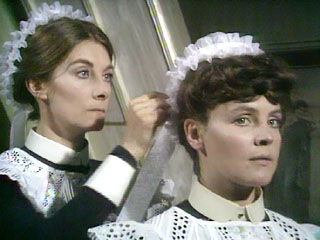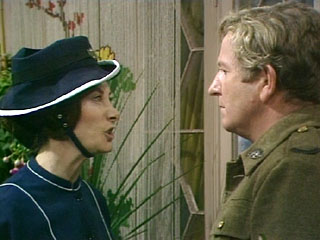Related Research Articles

Upstairs, Downstairs is a British drama television series produced by London Weekend Television (LWT) for ITV. It ran for 68 episodes divided into five series on ITV from 1971 to 1975.

Elizabeth Bellamy is a fictional character in the ITV period drama Upstairs, Downstairs, originally broadcast for five series from 1971 to 1975. She was portrayed by Nicola Pagett.

Sarah Moffat, also known as Sarah Delice and Clémence Dumas, is a fictional character in the ITV drama Upstairs, Downstairs and its spin-off Thomas & Sarah. She was portrayed by Pauline Collins.
"The Beastly Hun" is the third episode of the fourth series of the period drama Upstairs, Downstairs. It first aired on 28 September 1974 on ITV.
"Women shall not Weep" is the fourth episode of the fourth series of the period drama Upstairs, Downstairs. It first aired on 5 October 1974 on ITV.

"Home Fires" is the sixth episode of the fourth series of the period drama Upstairs, Downstairs. It first aired on 19 October 1974 on ITV.
"Another Year" is the ninth episode of the fourth series of the period drama Upstairs, Downstairs. It first aired on 9 November 1974 on ITV.
The Hero's Farewell is the tenth episode of the fourth series of the period drama Upstairs, Downstairs. It first aired on 16 November 1974 on ITV.
Peace Out of Pain is the thirteenth and final episode of the fourth series of the period drama Upstairs, Downstairs. It first aired on 7 December 1974 on ITV.
"A Place in the World" is the second episode of the fifth and final series of the period drama Upstairs, Downstairs. It first aired on 14 September 1975 on ITV.
"An Old Flame" is the sixth episode of the fifth and final series of the period drama Upstairs, Downstairs. It first aired on 12 October 1975 on ITV.
"Such a Lovely Man" is the eighth episode of the fifth and final series of the period drama Upstairs, Downstairs. It first aired on 26 October 1975 on ITV.
"The Understudy" is the tenth episode of the fifth and final season of the period drama Upstairs, Downstairs. It first aired on 9 November 1975 on ITV.
"Will Ye No Come Back Again" is the twelfth episode of the fifth and final series of the period drama Upstairs, Downstairs. It first aired on 23 November 1975 on ITV.

Major The Honourable James Rupert Bellamy is a fictional character in the ITV period drama Upstairs, Downstairs, that was originally broadcast for five series from 1971 to 1975. He was portrayed by Simon Williams.
"I Dies from Love" is the eighth episode of the first series of the British television series, Upstairs, Downstairs. The episode is set in the spring of 1907.
"Whom God Hath Joined..." is the fourth episode of the second series of the British television series, Upstairs, Downstairs. The episode is set in 1909.
"The Property of a Lady" is the sixth episode of the second series of the British television series, Upstairs, Downstairs. The episode is set in 1909.
"Why Is Her Door Locked?" is the ninth episode of the first series of the British television series, Upstairs, Downstairs. The episode is set in the summer of 1907.
References
- ↑ Updown.org.uk - Magic Casements - Upstairs, Downstairs
- ↑ Keats, John. – via Wikisource.